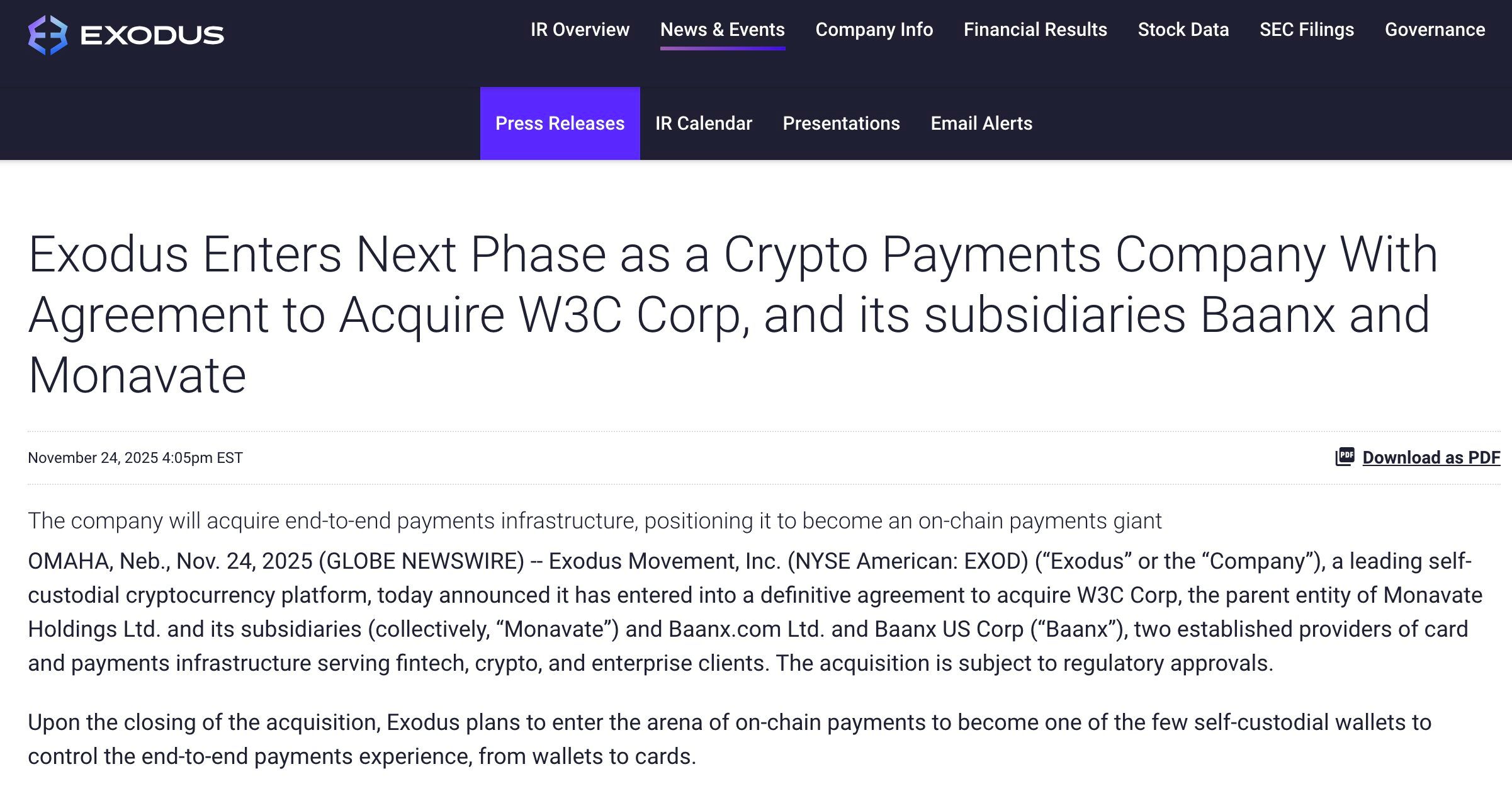Exodus Taps Bitcoin Reserves for $175M Move Into Onchain Payments
Quick Breakdown
- Exodus is acquiring W3C Corp for $175M, aiming to become a fully integrated onchain payments provider.
- A Bitcoin-backed credit facility with Galaxy Digital partly funds the deal.
- The move aligns with a broader industry push as Visa, Swift, and others accelerate the adoption of blockchain settlement.
Crypto wallet provider Exodus is making a bold leap into onchain payments, revealing plans to acquire W3C Corp, the parent company of payment infrastructure firms Monavate and Baanx, in a $175 million deal.
A Bid to own the entire payments pipeline
Exodus CEO JP Richardson said the acquisition is aimed at closing the long-standing gap between holding crypto and actually spending it.
 Source:
Exodus
Source:
Exodus
“By bringing card and payments infrastructure in-house, we are closing the gap between holding and spending, and positioning Exodus as the only platform you need for your money,”
he said.
By integrating Monavate and Baanx directly into its ecosystem, Exodus plans to internalize card issuance, processing and compliance tools. This reduces dependence on external vendors and expands the company’s capacity to support more payment assets, including popular stablecoins.
The move also gives Exodus the ability to issue cards through Visa, Mastercard and Discover.
Deal financed with Bitcoin-backed credit
To fund the $175 million acquisition, Exodus will combine cash reserves with borrowing from its credit line with Galaxy Digital, which is backed by the company’s Bitcoin holdings.
So far, Exodus has loaned $58.8 million to W3C to support its acquisitions of Monavate and Baanx, with the option to provide an additional $10 million in working capital. The whole transaction is expected to close in 2026.
Exodus CFO James Gernetzke said revenue streams from interchange, processing and program fees will form a key pillar of the company’s future payments business.
Integrations to boost XO swap and consumer tools
The company’s onchain aggregator XO Swap will gain access to Monavate and Baanx technologies for programmable payouts and turnkey card issuance. The investment follows Exodus’s recent purchase of Grateful, a LATAM-focused stablecoin payments platform.
Exodus’s expansion comes as global payment systems increasingly embrace stablecoins and blockchain settlement.
In September, Visa began piloting a system that enables banks to pre-fund cross-border transactions in USDC and EURC, offering faster settlement. Earlier, Swift announced a collaboration with Consensys and over 30 institutions to test a blockchain-based settlement layer designed for 24/7 global transfers.
Take control of your crypto portfolio with MARKETS PRO, DeFi Planet’s suite of analytics tools.”
Disclaimer: The content of this article solely reflects the author's opinion and does not represent the platform in any capacity. This article is not intended to serve as a reference for making investment decisions.
You may also like
IoTeX launches the world's first on-chain identity solution ioID designed specifically for smart devices
ioID is revolutionizing identity management for smart devices, allowing DePIN to authenticate devices, protect data, and unlock next-generation application scenarios within a user-owned ecosystem compatible with any blockchain.

Mars Morning News | Last week, global listed companies made a net purchase of $13.4 million in BTC, while Strategy did not buy any Bitcoin last week
Expectations for a Federal Reserve interest rate cut in December have risen, with Bitcoin briefly surpassing $89,000 and the Nasdaq surging 2.69%. There are internal disagreements within the Fed regarding rate cuts, causing a strong reaction in the cryptocurrency market. Summary generated by Mars AI. This summary is generated by the Mars AI model and its accuracy and completeness are still being iteratively updated.

The covert battle in the crypto industry escalates: 40% of job seekers are North Korean agents?
North Korean agents have infiltrated 15%-20% of crypto companies, and 30%-40% of job applications in the crypto industry may come from North Korean operatives. They act as proxies through remote work, using malware and social engineering to steal funds and manipulate infrastructure. North Korean hackers have stolen over $3 billion in cryptocurrency to fund nuclear weapons programs. Summary generated by Mars AI. This summary is generated by the Mars AI model, and its accuracy and completeness are still being iteratively improved.

Which targets are Wall Street short sellers eyeing? Goldman Sachs reveals the short-selling undercurrents amid the AI wave
Data shows that short selling in the US stock market has reached a five-year high. However, investors are not recklessly challenging AI giants; instead, they are targeting so-called "pseudo-beneficiaries"—companies that have surged on the AI concept but lack core competitiveness.
